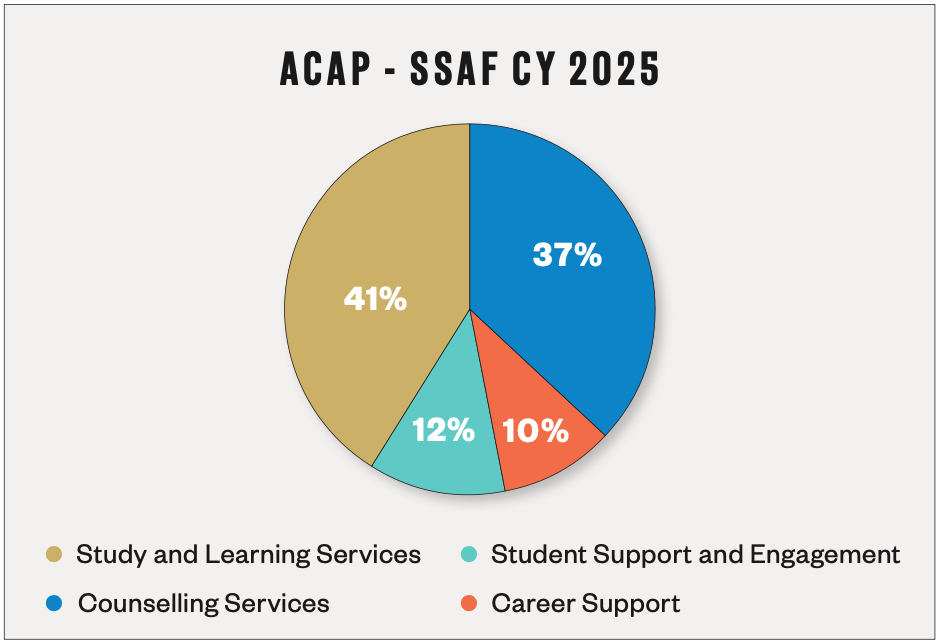Fees and Payments
Course fee and financial assistance information for Domestic and International students.

Fee Schedule
Our Fee Schedule is a comprehensive guide to course and unit fees. It outlines each ACAP University College course on offer, including information on units, student load and credit points. It also includes fee information for higher education courses. Courses may not be available at all campuses, or in all trimesters.
For full information about courses, please refer to course pages.
Tuition Fees and Payments
ACAP offers a range of tuition fee payment options such as FEE-HELP and Full Upfront Payments.*
You can select a payment option during the admission process, and if your circumstances change, you can request to change this method during your studies. Please note that the fees listed are indicative total course fees. Pricing of each unit of study may increase from time-to-time and does not take into account personal circumstances such as recognition of prior learning, credit or repeating a unit.
*No new students will be approved for a VET student loan (VSL)
KEY DATES AND Census Date
You should familiarise yourself with key date, particularly the census date. The census date is important as it is the last day you can:
- submit your form to access a FEE-HELP loan, or
- withdraw/cancel your enrolment in your course in full or in part without incurring the cost, debt, academic penalty for any currently enrolled subject or unit (see Enrolment Rules for procedures on varying, withdrawing or cancelling your enrolment).
This date varies across courses and trimesters. You can view the Census Dates on ACAP’s key dates page.
Census date is your last opportunity to withdraw from your course without facing financial or academic penalty.
To withdraw prior to census:
- Domestic students call 1800 039 139 or book a call back.
- International please email [email protected] or book a call back.
Domestic Student Tuition Fees and Payments
A Domestic student is a student who is an Australian citizen, a New Zealand citizen, an Australian Permanent Resident or the holder of an Australian permanent humanitarian visa.
Tuition fee payment options for Domestic students include the following:
- Upfront payment of fees due at the start of a program or course.
- Payment of remaining fees as outlined in the tuition fee invoice issued each trimester, due by the first day of that trimester.
- FEE-HELP (for approved programs and eligible students only).
International Student Tuition Fees and Payments
An International Student is a holder of an International Student Visa. Tuition fee payment options for International students include the following:
- First trimester tuition fees should be paid at the time of lodging the student admission agreement. An eCoE will then be issued on receipt of the first instalment.
- Payment of remaining fees as outlined in the tuition fee invoice, issued each study period, is due by the first day of that study period.
- Enrolment Fee (one-off, international students only): $250
A non-refundable enrolment fee is payable with all international student applications.
- Graduation (academic dress hire and ceremony tickets): See graduation page here.
- Textbooks: View the recommended textbook list and where to purchase them here.
- Library fees: View information on library fees here.
Alumni: Replacement of Documentation
All graduating students will receive a Graduating Pack, which contains official documentation of their Statement of Attainment, Statement of Results and Testamur. This Graduation pack is either presented at a Graduation ceremony or sent to the students home address at no cost to the student as recognition of their remarkable achievement.
If a replacement is required after twelve (12) months of graduating the following cost will be incurred:
- Replacement Statement of Attainment: $30 per copy
- Replacement Statement of Results: $30 per copy
- Replacement Testamur: $30 per copy
Please email [email protected] with your request.
What is FEE-HELP?
FEE-HELP is a loan from the Australian Government available to eligible fee-paying students enrolled in ACAP’s higher education courses to help pay part or all of their tuition fees.
A student can borrow up to the Higher Education Loan Program (HELP) loan limit. However, if repayments against a HELP debt to the Commonwealth are made then the balance of those repayments are credited against that person’s HELP balance. A student repays their loan through the taxation system once their repayment income is above the minimum repayment threshold for compulsory repayment.
Detailed information, the HELP factsheets and the HELP Booklets about accessing FEE-HELP are available at the Study Assist website.
Who is entitled to FEE-HELP?
To be entitled, students must be:
- an Australian citizen and study at least part of your course in Australia
- a New Zealand Special Category visa (SCV) holder or permanent humanitarian visa holder and meet the residency requirements
- a permanent visa holder who is undertaking bridging study for overseas-trained professionals and will be a resident in Australia for the duration of the study
- a pacific engagement visa holder who is a resident in Australia for the duration of your unit (s), from 1 February 2024
- enrolled in an eligible unit of study by the census date for that unit
- have an available HELP balance
Note: The Higher Education Support Act 2003 has been amended to remove the requirement that students must pass 50 per cent of the units they study to remain eligible for Commonwealth assistance in the form of a HELP loan. Students enrolled in units of study with census dates on or after 1 January 2024 will not need to meet the pass rate requirements.
What is a HELP loan limit?
The HELP loan limit is the cap on what you can borrow from the Australian Government through HELP loans to pay for your study. Your HELP loan limit depends on what you are studying, and the limit is Refer to the Study Assist website for more information on the annual HELP loan limit.
The HELP loan limit is set in legislation and is indexed on 1 January each year which increases the amount available. You can check your HELP balance on myHELPbalance.
A student will commence repaying any FEE-HELP loan through the Australian Taxation Office once their income reaches the minimum threshold for compulsory repayment ($54,435 in the 2024-2025 income year). Click for more information on loan repayment.
What is FEE-HELP loan fee?
When enrolled in a full fee-paying place at Table C providers (including ACAP), there is a 20% FEE-HELP loan fee applied to undergraduate courses that lead to the award of a higher education diploma, advanced diploma, associate degree, or a bachelor degree (pass, honours, or graduate entry). The loan fee is applied to each unit of study. The loan fee does not reduce a person’s HELP balance and is repaid through the taxation system.
How to apply for FEE-HELP
To apply for FEE-HELP, you will need to read the FEE-HELP information booklet. The booklet offers students information about each of the HELP loans under HELP Fact sheets.
If you are eligible and would like to defer your fees through FEE-HELP, you need to complete the online form via the eCAF system before the census date. eCAF applications will be emailed to students once the enrolment process is complete and all eligibility documents provided.
If you wish to apply, please contact and advise the Admissions Team via email [email protected].
UNIQUE STUDENT IDENTIFIER (USI)
The USI is a reference number made up of ten numbers and letters and will stay with you for life. To obtain a USI, go to the Unique Student Identifier website.
You will need to provide your USI as part of your enrolment process. In addition, if you seek Commonwealth financial assistance (e.g., FEE-HELP), you must provide your USI on your electronic Commonwealth Assistance Form (eCAF).
From 1 January 2023, all higher education students must have a USI to graduate and receive their award. This includes all students who started prior to 2021 as well as all international students studying onshore.
STUDENT FEE PAYMENT METHODS
A Provisional Invoice is available on the Student Portal under the Documentation – Financial. You can view your current balance on Invoices & Payment Options before you make a payment.
Pay via our online payment portal
ACAP accepts various payment options through the ACAP Payment Portal, powered by our official payment partner – Flywire.
This portal allows you to:
- Execute, track and confirm your payment online in a secure portal
- Use familiar payment options from your home country, in 140+ currencies
- Access a 24/7 multilingual customer support team for assistance
- Save on bank fees and ensure the best exchange rates with Flywire’s best price guarantee.
How to make a payment to ACAP
- Go to ACAP Payment Portal to begin your payment.
- Select the country from where you are paying and your preferred payment method.
- Enter your payment details and confirm your payment booking.
- Receive instructions on how to complete the payment process, depending on your payment method.
- Once payment is made you will have access to real-time payment tracking through email, in-app and text alerts
Watch these videos to find out more about Flywire
How to make a payment using Flywire
How to make an International Bank Transfer using Flywire
Having trouble with Flywire?
Email: [email protected]
Phone: +61 2 8311 4772
International Phone Numbers & FAQs: flywire.com/support
UPFRONT PAYMENT
ACAP accepts full or partial upfront payment of your trimester tuition fees via our ACAP Payment Portal. The amount payable will be included on your invoice each term and must be paid in full before the commencement of each trimester.
Failure to pay tuition fees by the due date will impact your ability to continue to study. Also, any unpaid tuition fees may affect international students’ confirmation of enrolment (CoE) and student visa status with the Department of Home Affairs.
Please note you will not be eligible to graduate until you have completed all required course components (see course structure information provided on the ACAP website for your course) and have no outstanding debts with us.
As offers can be sent out ahead of when you start your study, all fees provided on our offer letters are indicative only. This means that your tuition fees are subject to periodic review and adjustment, and the indicative fee is an estimate of the amount you will pay for your study at the time of the issuance.
Your actual fees will be outlined in the tuition fee invoice, issued each study period, based on the specific units you enrol in and the current cost of each unit. Any remaining balance is due by the first day of that study period.
Students can apply for a refund of upfront tuition fees and, or remission of FEE-HELP/VET Student Loan under special circumstances.
This application is only relevant to modules that have not been completed. You cannot apply for re-credit or refund under special circumstances if you have completed the module. Click here to find how to cancel your HELP debt under ‘special circumstances’.
It would help if you also familiarise yourself with ACAP’s Tuition Fee and Refund Policy and Re-crediting of HELP Balance Policy and Procedure.
Tuition Protection protects all domestic students at private higher education providers against default, whether the students pay their own fees up-front or use a HELP loan to pay for their studies. A default is where the provider closes, stops offering a course or unit of study, or fails to start a course or unit of study that has been paid for.
The Tuition Protection Service (TPS) assists students to continue their studies or receive a refund of their tuition fees or have their HELP balance re-credited if they used a HECS-HELP or FEE-HELP loan to pay for their studies.
For information about higher education tuition protection refer to our Statement of Tuition Assurance – Higher Education.
Local students (i.e. not on a temporary entry visa) may be eligible for student income support from Centrelink. Centrelink is the official Australian Commonwealth Government agency that assesses income, administers payments and ensures adequate distribution of information on benefits, allowances and pension payments as per the Social Security Laws.
Centrelink Income Support Assistance programs for students include Youth Allowance, Austudy and ABSTUDY. For further information, contact your local Centrelink.
scholarships

Student Services and Amenities Fee (SSAF)
The Student Services and Amenities Fee (SSAF) supports a wide range of non-academic student services, facilities and student-focused initiatives.
This government-approved fee is levied on all eligible students to allow us to allocate specific funding for services and activities that support students’ physical, mental, social, career and cultural wellbeing. The Higher Education Support Act 2003 (HESA) and the Student Services Amenities, Representation and Advocacy Guidelines (the Guidelines) outline how the funds are allocated, spent and reported.
SSAF-supported services will be available to all ACAP students, regardless of how and where you study, and we encourage you to take full advantage of them to enrich your College experience.
SSAF KEY INFORMATION
The Student Services and Amenities Fee is a Commonwealth Government legislated fee charged by many higher education providers across Australia to help fund support services for students of a non-academic nature, including career and employment advice, health and welfare support and recreational activities.
For more information on the SSAF in Australia, visit the Australian Government SSAF website.
The SSAF funding model is designed to achieve maximum benefit for the most students. It allows ACAP to use the collective contributions to fund as many programs as possible to support different students with a variety of needs across the entire student cohort, such as:
- Counselling services
- Careers and leadership development and advice
- Health and wellbeing services and promotion
- Helping secure student accommodation
- International Support
- IT services
- Financial support
- Food and beverage provision at college events
- Orientation
- Student amenities
- Student advocacy and legal services
- Student communications
- Student services, support, activities and events
- Supporting sporting, recreational and cultural activities.
All enrolled ACAP students will pay the SSAF, however there are some exceptions:
- Students on 100% scholarships
- Navitas staff
- Students who began studying before January 2012
- Students in VET, non-award courses, and short courses (up to 16 weeks’ coursework)
Note: This exemption list may be amended in future trimesters.
The maximum SSAF amount students are required to pay is determined by the government and depends on study load.
The maximum 2025 SSAF for ACAP is set at $365 for full-time students. The fee is charged per trimester at:
- $121.00 for full-time students* (FT = study load of 2 units and above)
- $91.00 for part-time students (PT = a study load of 1 unit)
*SSAF-related Government Guidelines define ‘full-time’ as a study load of 0.25 EFTSL and above (normally the equivalent of 2 units and above), however this may differ to other definitions, such as those used by other government services and ACAP.
Liability for the SSAF is based on enrolled study load at each trimester’s census date.
The amount you pay will depend on your enrolled study load at each census date.
The SSAF is a compulsory charge for all students enrolled at ACAP.
The payment date or the date that the debt is incurred for SSAF is on census date, however cannot be earlier than the last dates students are able to enrol in a course.
The maximum annual SSAF that can be charged is determined by the Commonwealth Government. In 2025 this will be up to $365 for a full-time student. Students studying on a part-time basis cannot be charged more than 75% of the maximum amount that the students studying on a full-time basis are charged. The fee may be indexed annually.
The SSAF can be paid via up front or by deferring the fee.
Option 1: Pay upfront
If you are a domestic student, we will send you an invoice each trimester that requires you to pay the fee by that trimester’s census date. If you’re an international student, you’ll need to pay your SSAF upfront, by that trimester’s commencement date, with a refund provided to any student who withdraws prior to census date.
Option 2: Defer your fees through SA-HELP
Eligible students who are enrolled in an award course may choose to defer part, or all, of their fees through SA-HELP. All other students must pay their fees upfront, directly to ACAP.
To defer the SSAF you need to complete a ‘Request for SA-HELP’ form. Students who use SA-HELP will be required to pay their SSAF debt through the tax system when they earn above the minimum threshold for compulsory repayment, in the same way that FEE HELP works. Forms are available from the Student Engagement team.
Remember, if you are eligible and are going to defer your SSAF, you need to do this before the required payment date.
When you haven’t paid or deferred your SSAF payment, you can expect to receive reminder notifications following the SSAF deadline at Census.
The SSAF is a compulsory charge – if you have not paid your Student Services and Amenities Fee (SSAF) instalment invoice by the payment due date penalties will apply as outlined in the Tuition Fee and Refund Policy.

Student Services and Amenities Fee (SSAF) Proposed Spend 2025
We have spoken to our students and they have told us how they would most like to see their SSAF dollars spent.
All students will continue to have the opportunity to contribute to the decision-making process for future SSAF spending, including through democratically elected student representatives.
We have published details of these priorities below.
Support from more Academic Skills Advisors and the 24/7 national online resource, Studiosity, to help students develop and improve their core academic and study skills.
Increased support for students’ wellbeing, including student counsellors, the Student First Wellness Strategy, and a dedicated part-time social worker to advise and assist on social welfare matters such as health, housing and finance.
A continuation of ACAP’s learning and professional counselling services, and specific resources for international students, including one-on-one support, to help with assimilation into Australian life, as well as student-led activities, such as increased student campus and offsite activities for all students, and enhanced orientation and information packs for new students.
Continued career advising services and industry engagement measures to assist students and graduates with future employment opportunities in their chosen field, including support from full-time careers advisors, 24/7 accessible tools, tips and resources from the Employability Toolkit, and the design and implementation of employment strategies.
SSAF Frequently asked questions
The SSAF model allows funding to areas which would not normally be allocated through operational costs or cannot be funded due to legislation or education guidelines. It allows ACAP to allocate funding to services, facilities and student-focused initiatives that would otherwise be unsupported or unable to go ahead.
Services provided through the SSAF funding are made available to all ACAP students, and it is up to each individual student to choose their level of engagement with these services and activities.
SA-HELP is a Commonwealth loan available to eligible students to pay their Student Services and Amenities Fee (SSAF).
Your Student Services and Amenities Fee (SSAF) is not covered under FEE-HELP. However, eligible students may apply for SA-HELP to pay for all or part of the SSAF.

SSAF Consultation and Achievements
In its first year at ACAP University College, the SSAF has supported the provision of a range of non-academic services and facilities for all students. Following student consultation at the start of 2024 – through a combination of surveys, emails and discussions at local campus meetings – key priorities for the year were identified as:
-
Student Academic Support (37%)
-
Health and Welfare (26%)
-
Career Support (23%)
-
Student Support and Engagement (14%).
Following student feedback, ACAP students then identified career and employment services as their top priority, followed by study and learning services, enhanced support services for international students, counselling services, and orientation activities. Formal feedback was sought from elected student representatives, as members of the National Student Consultative Committee (NSCC), which aligned with the requests of the broader student body.
Based on student insights, a comprehensive SSAF-funded consultation on employability and career development was conducted and, after extensive engagement with professional and academic staff and students, a final report was prepared. The report focuses on enhancing employability, curriculum alignment, and industry integration for ACAP students. It outlines a detailed framework for a strategic approach to integrating employability into the ACAP curriculum and student experience.
Key recommendations:
- Redefine employability to encompass a broader range of skills and career stages.
- Implement a skills-based framework across all courses.
- Enhance curriculum and assessment
- Rename transferable skills to “professional skills” to better reflect their importance.
- Regularly review and update the Employability Toolkit.
- Align graduate attributes with industry standards.
- Develop a Work Integrated Learning (WIL) framework.
- Redesign course maps and unit guides to link learning outcomes to career development.
- Incorporate employability development into student portfolios.
- Improve student support and engagement.
- Enhance communication strategies to target different student groups.
- Identify and promote existing employability activities.
- Review marketing materials to emphasise skills development and professional standards.
- Create an employability award to recognise student achievement.
These recommendations aim to create a more coherent and practical approach to employability education, equipping students with the necessary skills and knowledge to succeed in their chosen careers.
The Employability Toolkit, a comprehensive online module, was made available to all students in Moodle. Developed with student input, the online toolkit includes resources for career activation, industry connections, portfolio and profile development, and industry experience. It will be updated with videos featuring industry practitioners reflecting on various career activation and employability aspects.
Following the appointment of an International Student Engagement Coordinator, the following initiatives and resources have been launched and/or revised:
- Design of a six-week email campaign and creation of short video resources, designed to provide international students with essential information and insights to help them navigate and embrace their new surroundings with confidence. Topics include:
- Welcome to Australia
- Cost of living and Australian rentals
- Getting around and transportation
- Government and important information
- Employment
- What to see and do.
- Development of Campus Guides specific to International Students.
And specific to the admissions and student engagement team:
- A comprehensive overhaul of the ‘international’ area of student portal.
- The development of training resources to equip campus teams regarding international student systems and processes.
This role has already proven to be successful, and ACAP remains committed to gathering student feedback to further enhance the international student experience.
The Social Work service has been successfully launched and is fully accessible to students. The initial setup has included consultation with both students and academic staff to ensure the service aligns with the community’s needs. The Social Worker has also conducted a review of relevant documents and policies, including the SSAF survey, outlining student feedback on priorities and needs. This collaborative approach has enabled the development of social work services tailored to meet the specific needs of our students.
The Social Worker has presented at orientation and the service has been launched on the ACAP website. The next phase of the rollout will focus on the development of informative videos to showcase the range of services available to students to further enhance accessibility and awareness.
The Learning Hub welcomed its new Careers and Employability Advisor (CEA) during T3, 2024. This SSAF-funded role will service all learners at ACAP by integrating career planning and employability activities throughout the student journey. The following undertakings comprise the service design, which are facilitated via the Learning Hub and utilise the existing digital infrastructure for other advisors in that team:
- Workshops and webinars: An expanding program of workshops and webinars will embed employability thinking into all stages of the student learning journey, from onboarding through to graduation. Student touchpoints will focus on preparation for, and reflection on, professional practice, including WIL, field placement opportunities and volunteering.
- 1:1 career coaching consultation: Limited availability of 1:1 coaching sessions and campus-based drop-ins will support students to succeed in their development of employability literacies following engagement with key workshops and webinars.
- Resource development (Employability Toolkit): Continuous enhancements for the Employability Toolkit, including the co-design and delivery of new discipline- and course-specific materials are scheduled for the 2025 calendar year.
- My Career Portfolio program: By prioritising the delivery of careers and employability resources for first year students, commencing students will be supported early with information and coaching to support WIL readiness. While new students will benefit from the timely delivery of this program, continuing students will also receive access.

Contact Us
For more information about the SSAF call 1800 061 199, or email [email protected].
Have Your Say
We welcome and encourage feedback from students on our SSAF processes. Have your say by emailing us at [email protected].

